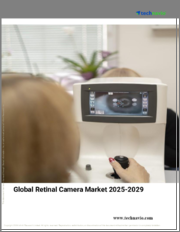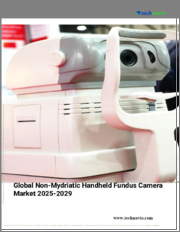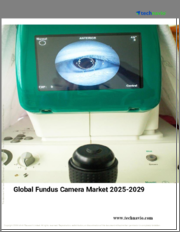
|
시장보고서
상품코드
1900363
안저 카메라 시장 - 규모, 점유율, 성장 분석 : 이미지 유형별, 제품 유형별, 휴대성별, 용도별, 최종 사용자별, 지역별 산업 예측(2026-2033년)Fundus Cameras Market Size, Share, and Growth Analysis, By Image Type (Colour Fundus Camera, Multicolour Fundus Camera), By Product, By Portability, By Application, By End User, By Region - Industry Forecast 2026-2033 |
||||||
세계의 안저 카메라 시장 규모는 2024년 6억 7,275만 달러로 평가되었고, 2025년 7억 706만 달러에서 2033년까지 10억 5,264만 달러로 성장할 전망입니다. 예측기간 중(2026-2033년) CAGR은 5.1%로 예상됩니다.
세계의 안저 카메라 시장은 당뇨병성 망막증, 황반변성, 녹내장 등 안질환의 발생률 상승을 배경으로 현저한 성장을 이루고 있습니다. 이 질병은 조기 발견을 위한 지속적인 스크리닝이 필요합니다. 비산동형이나 휴대형 핸드헬드 안저 카메라 등의 기술 혁신에 의해 특히 원격지에서 안과 검사의 접근성이 향상되었습니다. 인공지능(AI)과 머신러닝의 통합은 이러한 기기의 진단 능력을 높이고, 망막 이미지의 자동 분석을 가능하게 하고, 정밀도를 향상시키고 있습니다. 또한, 고령화 사회의 진전, 의료비 지출 증가, 눈 건강에 대한 의식 증가 등의 요인도 시장 확대에 기여하고 있습니다. 그러나 장치의 높은 비용, 일부 지역에서 안과 의료에 대한 액세스 제한, 데이터 프라이버시에 대한 우려 등의 과제도 여전히 존재합니다. 지속적인 R&D와 산업 내 협력은 시장의 지속적인 발전을 기대할 수 있습니다.
안저 카메라 시장의 촉진 요인
안저 카메라 시장의 성장을 견인하는 중요한 요인은 안질환의 발생률 상승입니다. 당뇨병성 망막증, 황반변성, 녹내장 등의 증례 증가에 따라 이러한 질환의 조기 발견, 진단 및 경과 관찰에 필수적인 안저 카메라 수요가 높아지고 있습니다. 게다가 정기적인 안과 검진의 필요성에 대한 인식 증가와 영상 진단 장치의 기술 진보가 시장의 확대를 크게 뒷받침하고 있습니다. 의료 종사자와 환자가 적극적인 눈 관리의 중요성을 인식함에 따라 이러한 진단 도구에 대한 수요는 계속 증가하고 시장 발전을 더욱 촉진하고 있습니다.
안저 카메라 시장 억제 요인
안저 카메라 시장에서 큰 도전은 고급 장비와 관련된 높은 비용입니다. 복잡한 개발 및 제조 공정에는 조사, 기술 및 생산 능력에 대한 엄청난 투자가 필요합니다. 결과적으로, 이러한 고급 장비의 초기 도입 비용은 매우 비쌉니다. 특히 자원이 부족한 환경과 의료 자금이 제한된 지역의 의료시설에 장벽이 됩니다. 이러한 고가의 가격 설정은 특히 경제적으로 어려운 지역에서 안저 카메라의 광범위한 보급과 가용성을 방해할 수 있으며, 이로 인해 이러한 기술이 눈 건강 상태를 개선할 수 있는 잠재적인 이익을 제한할 수 있습니다.
안저 카메라 시장 동향
안저 카메라 시장에서는 인공지능(AI)과 머신러닝 알고리즘의 통합을 위한 현저한 동향을 볼 수 있어 망막 이미지의 분석 방법에 혁명을 가져오고 있습니다. 이 혁신에 의해 진단 효율과 정밀도가 향상되어 의료 종사자가 다양한 안질환을 보다 정확하게 검출하고 경과를 관찰할 수 있게 됩니다. 첨단 소프트웨어 개발로 망막 이미지의 해석을 자동화할 수 있으며, 이는 컴퓨터 비전 기술의 진보와 교육을 위한 엄청난 데이터 세트에 대한 접근 가능성에 의해 추진되고 있습니다. 안과 분야의 신속하고 객관적인 진단 솔루션에 대한 수요가 증가함에 따라, AI를 탑재한 안저 카메라는 안과 진료의 실천을 변화시키는 데 중요한 역할을 할 것으로 기대되고 있습니다.
자주 묻는 질문
목차
소개
- 조사 목적
- 조사 범위
- 정의
조사 방법
- 정보 조달
- 2차 및 1차 데이터 수집 방법
- 시장 규모 예측
- 시장의 전제조건과 제한
주요 요약
- 세계 시장 전망
- 공급과 수요 동향 분석
- 부문별 기회 분석
시장 역학과 전망
- 시장 규모
- 시장 역학
- 촉진 요인과 기회
- 억제 요인과 과제
- Porter's Five Forces 분석
주요 시장 인사이트
- 중요 성공요인
- 경쟁도
- 주요 투자 기회
- 시장 생태계
- 시장의 매력 지수(2025년)
- PESTEL 분석
- 거시경제 지표
- 밸류체인 분석
- 가격 분석
- 규제 상황
- 사례 연구
- 기술 분석
세계의 안저 카메라 시장 : 이미지 유형별 규모 및 CAGR(2026-2033년)
- 컬러 안저 카메라
- 다색 안저 카메라
- 입체 안저 카메라
세계의 안저 카메라 시장 : 제품별 규모 및 CAGR(2026-2033년)
- 산동식 안저 카메라
- 비산동식 안저 카메라
- 하이브리드 안저 카메라
- 미숙아 망막증용 안저 카메라
세계의 안저 카메라 시장 : 휴대성별 규모 및 CAGR(2026-2033년)
- 휴대형
- 탁상형
세계의 안저 카메라 시장 : 용도별 규모 및 CAGR(2026-2033년)
- 당뇨병성 망막증
- 녹내장
- 노화 황반변성
- 기타
세계의 안저 카메라 시장 : 최종 사용자별 규모 및 CAGR(2026-2033년)
- 병원
- 안과 클리닉
- 기타
세계의 안저 카메라 시장 : 규모 및 CAGR(2026-2033년)
- 북미
- 미국
- 캐나다
- 유럽
- 독일
- 스페인
- 프랑스
- 영국
- 이탈리아
- 기타 유럽
- 아시아태평양
- 중국
- 인도
- 일본
- 한국
- 기타 아시아태평양
- 라틴아메리카
- 브라질
- 기타 라틴아메리카
- 중동 및 아프리카
- GCC 국가
- 남아프리카
- 기타 중동 및 아프리카
경쟁 정보
- 상위 5개사 비교
- 주요 기업의 시장 포지셔닝(2025년)
- 주요 시장 기업이 채용한 전략
- 최근 시장 동향
- 기업의 시장 점유율 분석(2025년)
- 주요 기업 프로파일
- 기업 상세
- 제품 포트폴리오 분석
- 기업의 부문별 점유율 분석
- 전년대비 수익 비교(2023-2025년)
주요 기업 프로파일
- Carl Zeiss Meditec AG(Germany)
- Kowa Company Ltd.(Japan)
- Optomed Oy(Finland)
- Optovue, Incorporated(USA)
- CenterVue SpA(Italy)
- NIDEK Co., Ltd.(Japan)
- Topcon Medical Systems, Inc.(USA)
- Clarity Medical Systems, Inc.(USA)
- Canon, Inc.(Japan)
- Revenio Group Oyj(Finland)
- Forus Health Pvt. Ltd.(India)
- Heidelberg Engineering GmbH(Germany)
- Iridex Corporation(USA)
- Optomed Ltd.(Finland)
- Beye, LLC(USA)
- HEINE Optotechnik GmbH & Co. KG(Germany)
- Phelcom Technologies(Russia)
- Medimaging Integrated Solution, Inc.(Taiwan)
- Oculus Optikgerate GmbH(Germany)
- Visunex Medical Systems, Inc.(USA)
결론과 권고
JHS 26.01.16Fundus Cameras Market size was valued at USD 672.75 Million in 2024 and is poised to grow from USD 707.06 Million in 2025 to USD 1052.64 Million by 2033, growing at a CAGR of 5.1% during the forecast period (2026-2033).
The global fundus cameras market is experiencing significant growth, driven by the rising incidence of eye disorders like diabetic retinopathy, macular degeneration, and glaucoma, which require ongoing screening for early detection. Technological innovations, including non-mydriatic and portable handheld fundus cameras, have made eye examinations more accessible, especially in remote regions. The integration of artificial intelligence and machine learning enhances these devices' diagnostic abilities, enabling automated analysis of retinal images and improving accuracy. Additionally, factors such as an aging population, increasing healthcare spending, and heightened awareness about eye health contribute to market expansion. However, challenges persist, including high device costs, limited access to eye care in some areas, and data privacy concerns. Continuous R&D and partnerships within the industry promise sustained market development.
Top-down and bottom-up approaches were used to estimate and validate the size of the Fundus Cameras market and to estimate the size of various other dependent submarkets. The research methodology used to estimate the market size includes the following details: The key players in the market were identified through secondary research, and their market shares in the respective regions were determined through primary and secondary research. This entire procedure includes the study of the annual and financial reports of the top market players and extensive interviews for key insights from industry leaders such as CEOs, VPs, directors, and marketing executives. All percentage shares split, and breakdowns were determined using secondary sources and verified through Primary sources. All possible parameters that affect the markets covered in this research study have been accounted for, viewed in extensive detail, verified through primary research, and analyzed to get the final quantitative and qualitative data.
Fundus Cameras Market Segments Analysis
Global Fundus Cameras Market is segmented by Image Type, Product, Portability, Application, End User and region. Based on Image Type, the market is segmented into Colour Fundus Camera, Multicolour Fundus Camera and Stereoscopic Fundus Camera. Based on Product, the market is segmented into Mydriatic Fundus Cameras, Non-Mydriatic Fundus Cameras, Hybrid Fundus Cameras and ROP Fundus Cameras. Based on Portability, the market is segmented into Handheld and Tabletop. Based on Application, the market is segmented into Diabetic Retinopathy, Glaucoma, Age-Related Macular Degeneration and Others. Based on End User, the market is segmented into Hospitals, Ophthalmology Clinics and Others. Based on region, the market is segmented into North America, Europe, Asia Pacific, Latin America and Middle East & Africa.
Driver of the Fundus Cameras Market
A significant factor fueling the growth of the Fundus Cameras market is the rising occurrence of eye-related ailments. The increasing cases of conditions like diabetic retinopathy, macular degeneration, and glaucoma enhance the need for fundus cameras, which are essential for the early identification, diagnosis, and ongoing assessment of these diseases. Additionally, heightened awareness regarding the necessity of routine eye examinations, along with technological advancements in imaging devices, significantly bolsters the market's expansion. As healthcare providers and patients recognize the importance of proactive eye care, the demand for these diagnostic tools continues to rise, further driving the market's development.
Restraints in the Fundus Cameras Market
A significant challenge within the Fundus Cameras market is the elevated cost linked to advanced devices. The intricate development and manufacturing processes demand considerable investments in research, technology, and production capabilities. Consequently, the initial acquisition cost for these sophisticated devices can be quite high, presenting obstacles for healthcare facilities, particularly those in low-resource environments or areas with restricted healthcare funding. This expensive price point can impede the broad adoption and accessibility of fundus cameras, especially in economically challenged regions, thereby limiting the potential benefits these technologies could provide in improving ocular health outcomes.
Market Trends of the Fundus Cameras Market
The Fundus Cameras market is witnessing a significant trend toward the integration of artificial intelligence (AI) and machine learning algorithms, revolutionizing the way retinal images are analyzed. This innovation enhances diagnostic efficiency and accuracy, allowing healthcare professionals to better detect and monitor various eye conditions. The development of sophisticated software that can automate the interpretation of retinal images is being propelled by advancements in computer vision technology and the accessibility of extensive datasets for training. As the demand for rapid and objective diagnostic solutions in ophthalmology grows, AI-powered fundus cameras are positioned to play a crucial role in transforming eye care practices.
Table of Contents
Introduction
- Objectives of the Study
- Scope of the Report
- Definitions
Research Methodology
- Information Procurement
- Secondary & Primary Data Methods
- Market Size Estimation
- Market Assumptions & Limitations
Executive Summary
- Global Market Outlook
- Supply & Demand Trend Analysis
- Segmental Opportunity Analysis
Market Dynamics & Outlook
- Market Overview
- Market Size
- Market Dynamics
- Drivers & Opportunities
- Restraints & Challenges
- Porters Analysis
- Competitive rivalry
- Threat of substitute
- Bargaining power of buyers
- Threat of new entrants
- Bargaining power of suppliers
Key Market Insights
- Key Success Factors
- Degree of Competition
- Top Investment Pockets
- Market Ecosystem
- Market Attractiveness Index, 2025
- PESTEL Analysis
- Macro-Economic Indicators
- Value Chain Analysis
- Pricing Analysis
- Regulatory Landscape
- Case Studies
- Technology Analysis
Global Fundus Cameras Market Size by Image Type & CAGR (2026-2033)
- Market Overview
- Colour Fundus Camera
- Multicolour Fundus Camera
- Stereoscopic Fundus Camera
Global Fundus Cameras Market Size by Product & CAGR (2026-2033)
- Market Overview
- Mydriatic Fundus Cameras
- Non-Mydriatic Fundus Cameras
- Hybrid Fundus Cameras
- ROP Fundus Cameras
Global Fundus Cameras Market Size by Portability & CAGR (2026-2033)
- Market Overview
- Handheld
- Tabletop
Global Fundus Cameras Market Size by Application & CAGR (2026-2033)
- Market Overview
- Diabetic Retinopathy
- Glaucoma
- Age-Related Macular Degeneration
- Others
Global Fundus Cameras Market Size by End User & CAGR (2026-2033)
- Market Overview
- Hospitals
- Ophthalmology Clinics
- Others
Global Fundus Cameras Market Size & CAGR (2026-2033)
- North America (Image Type, Product, Portability, Application, End User)
- US
- Canada
- Europe (Image Type, Product, Portability, Application, End User)
- Germany
- Spain
- France
- UK
- Italy
- Rest of Europe
- Asia Pacific (Image Type, Product, Portability, Application, End User)
- China
- India
- Japan
- South Korea
- Rest of Asia-Pacific
- Latin America (Image Type, Product, Portability, Application, End User)
- Brazil
- Rest of Latin America
- Middle East & Africa (Image Type, Product, Portability, Application, End User)
- GCC Countries
- South Africa
- Rest of Middle East & Africa
Competitive Intelligence
- Top 5 Player Comparison
- Market Positioning of Key Players, 2025
- Strategies Adopted by Key Market Players
- Recent Developments in the Market
- Company Market Share Analysis, 2025
- Company Profiles of All Key Players
- Company Details
- Product Portfolio Analysis
- Company's Segmental Share Analysis
- Revenue Y-O-Y Comparison (2023-2025)
Key Company Profiles
- Carl Zeiss Meditec AG (Germany)
- Company Overview
- Business Segment Overview
- Financial Updates
- Key Developments
- Kowa Company Ltd. (Japan)
- Company Overview
- Business Segment Overview
- Financial Updates
- Key Developments
- Optomed Oy (Finland)
- Company Overview
- Business Segment Overview
- Financial Updates
- Key Developments
- Optovue, Incorporated (USA)
- Company Overview
- Business Segment Overview
- Financial Updates
- Key Developments
- CenterVue SpA (Italy)
- Company Overview
- Business Segment Overview
- Financial Updates
- Key Developments
- NIDEK Co., Ltd. (Japan)
- Company Overview
- Business Segment Overview
- Financial Updates
- Key Developments
- Topcon Medical Systems, Inc. (USA)
- Company Overview
- Business Segment Overview
- Financial Updates
- Key Developments
- Clarity Medical Systems, Inc. (USA)
- Company Overview
- Business Segment Overview
- Financial Updates
- Key Developments
- Canon, Inc. (Japan)
- Company Overview
- Business Segment Overview
- Financial Updates
- Key Developments
- Revenio Group Oyj (Finland)
- Company Overview
- Business Segment Overview
- Financial Updates
- Key Developments
- Forus Health Pvt. Ltd. (India)
- Company Overview
- Business Segment Overview
- Financial Updates
- Key Developments
- Heidelberg Engineering GmbH (Germany)
- Company Overview
- Business Segment Overview
- Financial Updates
- Key Developments
- Iridex Corporation (USA)
- Company Overview
- Business Segment Overview
- Financial Updates
- Key Developments
- Optomed Ltd. (Finland)
- Company Overview
- Business Segment Overview
- Financial Updates
- Key Developments
- Beye, LLC (USA)
- Company Overview
- Business Segment Overview
- Financial Updates
- Key Developments
- HEINE Optotechnik GmbH & Co. KG (Germany)
- Company Overview
- Business Segment Overview
- Financial Updates
- Key Developments
- Phelcom Technologies (Russia)
- Company Overview
- Business Segment Overview
- Financial Updates
- Key Developments
- Medimaging Integrated Solution, Inc. (Taiwan)
- Company Overview
- Business Segment Overview
- Financial Updates
- Key Developments
- Oculus Optikgerate GmbH (Germany)
- Company Overview
- Business Segment Overview
- Financial Updates
- Key Developments
- Visunex Medical Systems, Inc. (USA)
- Company Overview
- Business Segment Overview
- Financial Updates
- Key Developments



















